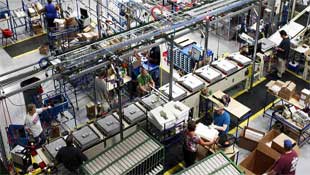| |
|
| |
|
 |
Supply
Chain by the Numbers |
| |
|
| |
- July 21, 2022
|
| |
|
| |
|
| |
|
| |
Logistics Groups Ask for AB 5 Enforcement Delay; US Manufacturing Down again; Water Levels on Rhine a Growing Concern for Freight Movements; Macy's Advancing Smaller Stores |
| |
|
| |
| |
| |
| |
70+ |
|
That’s how many trade associations representing wide-ranging supply chain interests that sent a letter to California Gov. Gavin Newsom asking him to issue an executive order to temporarily pause enforcement of the state’s AB 5 contractor law. The letter, signed July 11 by trade organizations representing interests ranging from trucking and retail to agriculture and business, also asked Newsom, a Democrat, to immediately call labor and industry to the table “to negotiate a path forward to preserve small business trucking in the state of California and prevent further disruptions to the supply chain.” That after the US Supreme Court in late June declined to hear a legal challenge by the California Trucking Association to the controversial AB 5 law, which puts into effect a three-part test intended to reclassify independent owner-operators and contract drivers as motor carrier employees (as well as applying to many other jobs in the state). The letter said that of the 73,023 trucking companies active in California in 2017, 71.3% (or 52,064) of these companies ran just a single truck. In total, 91.8% of all trucking companies in California operated five or fewer trucks in 2017. Enforcement of the law now could cause logistics chaos. |
|
|
| |
| |
|
|
 |
| That was the level of US manufacturing output in June, according to the monthly report from the Federal Reserve Bank issued last Friday. That was down from 102.2 in May, and represents the second straight month of decline in the index. That led to concerns about weakness in the US manufacturing sector, though the reading as up a decent 3.6% versus Jul 2021. Still, at 101.6 it means US manufacturing is only 1.6% above the baseline year of 2012 (index = 100) , now some 10 years later. It is also well below the all-time high of about 110 set in late 2010. |
|
|
|
| |
| |
5 |
|
That is how many smaller format stores mall-oriented retailer Macy’s has opened in non-mall settings in recent years. That’s newsworthy because Macy’s said this week it is accelerating its plans to open the smaller stores that aren’t attached to suburban shopping malls, in a bid to evolve along with its customers’ shopping preferences coming out of the Covid pandemic. The department store chain said Wednesday that it will open three stores, called The Market by Macy’s, this fall. Going small and getting away from the mall has become somewhat of a trend in the retail industry. It’s a blueprint that retailers from Gap to Nordstrom have been following. Kohl’s also said it’s aiming to open 100 smaller-footprint locations over the next four years. The Market by Macy’s stores are about one-fifth of the size of its full-line locations and tout services such as buy online, pick up in store. |
| |
| |
| |
| |
| |
|
|
|
| |
 |
 |
| |
 |
![]() |
 |
|
| |
 |
Feedback |
|
|
|
![]()
|
No Feedback on this article yet.
|
|
![]() |
|
|
|
![]() |
 |
![]() |
 |
|
| |